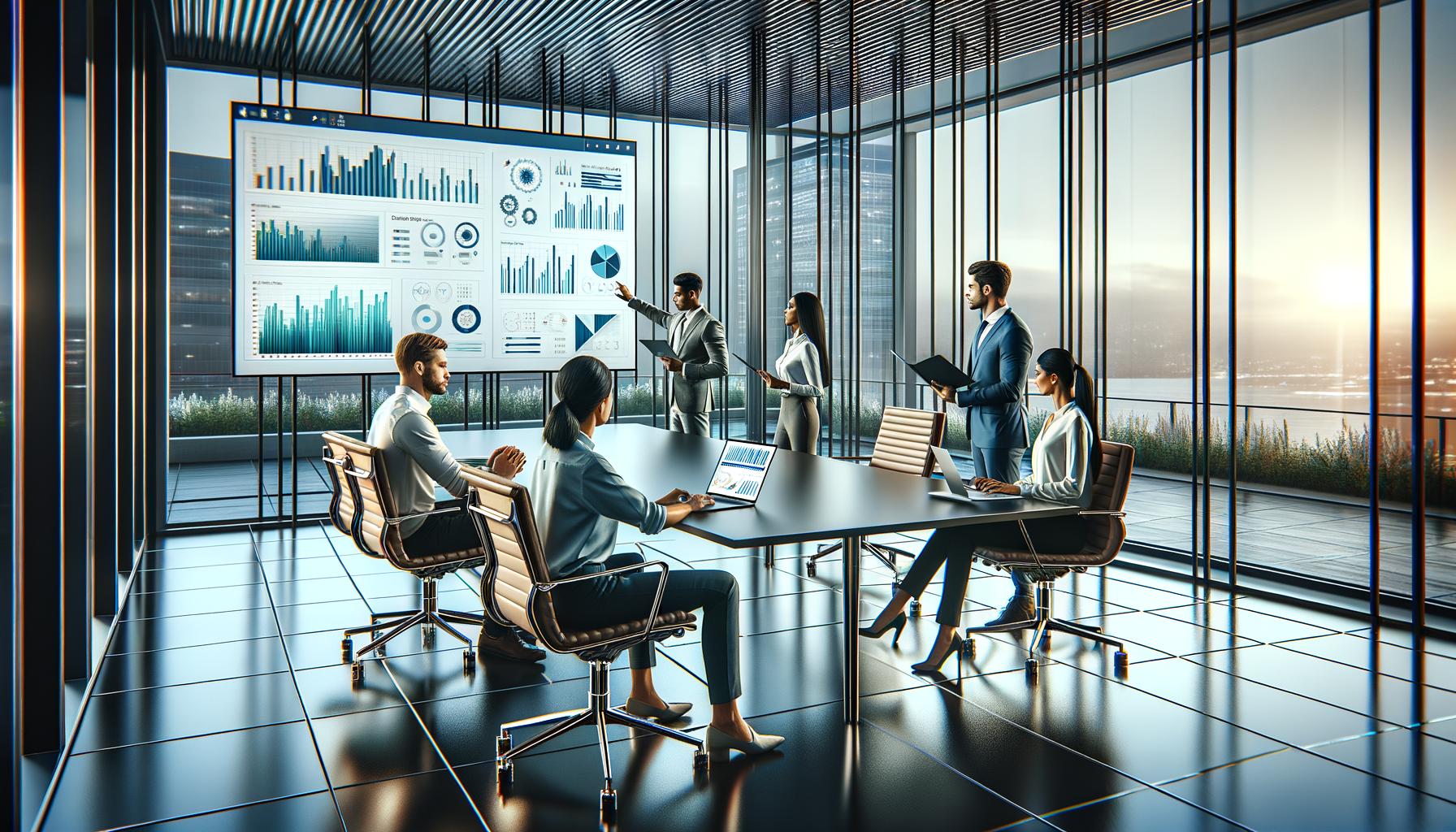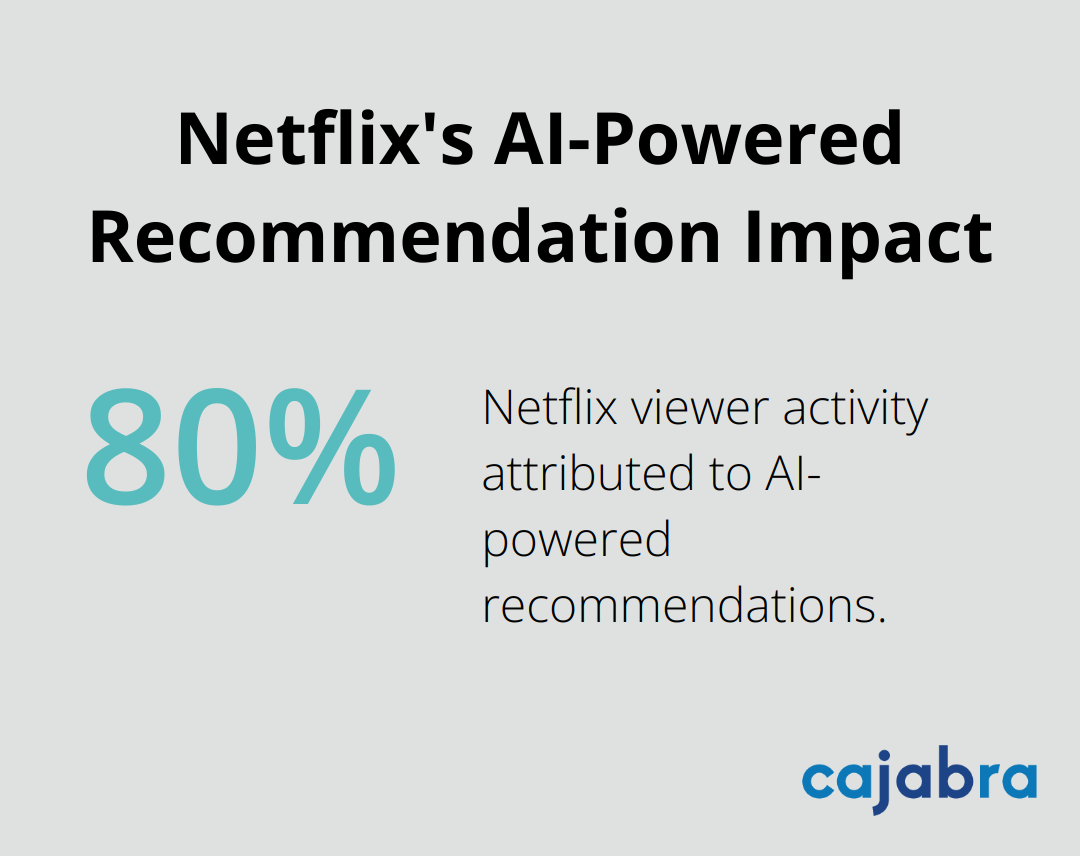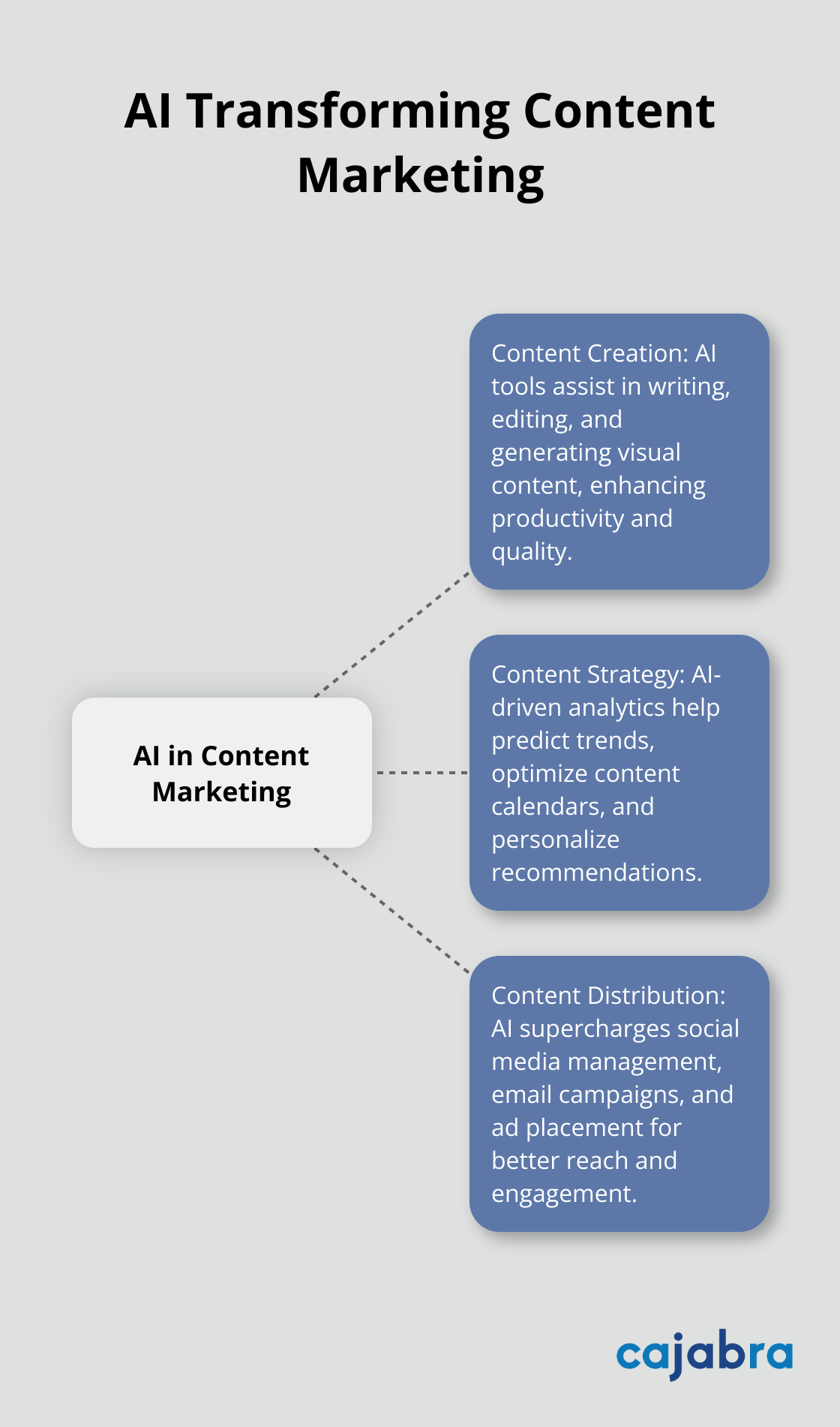
AI and content marketing are transforming the way businesses connect with their audiences. At Cajabra, LLC, we've seen firsthand how artificial intelligence can supercharge content strategies and deliver impressive results.
This blog post will explore the practical applications of AI in content creation, strategy, and distribution. We'll provide actionable tips to help you harness the power of AI and elevate your content marketing efforts.
AI-powered content creation tools have revolutionized the marketing landscape. These tools don't just save time; they transform how content marketers scale their output without compromising quality.
Natural Language Generation (NLG) platforms have evolved significantly. AI-generated content offers advantages like speed, scalability, and SEO optimization, helping businesses produce high-quality material. However, these platforms require human oversight to maintain brand voice consistency and factual accuracy.
AI writing assistants have become essential for many content teams. Grammarly, for example, offers more than simple spell-checking. It provides style and tone suggestions that enhance writing quality. These tools help maintain a consistent brand voice across all content pieces, which builds trust with the audience.
AI-generated visuals continue to expand in capability and application. AI reshapes visual storytelling through generative tools, which create stunning images, videos, and animations from simple prompts. AI can also enhance visual content creation, offering new possibilities for marketers and creators.
While AI tools offer powerful capabilities, they work best as part of a human-led creative process. A hybrid approach where AI augments human creativity (rather than replacing it) ensures that content remains authentic and aligns with a brand's unique voice and values.
To maximize the effectiveness of AI content creation tools, consider the following tips:
As AI continues to advance, it opens new possibilities for content personalization and optimization. The next section will explore how AI enhances content strategy and planning, allowing marketers to make data-driven decisions and create more targeted, effective campaigns.
AI transforms content strategy and planning, enabling marketers to make data-driven decisions and create more targeted, effective campaigns. This chapter explores how AI reshapes content strategy through predictive analytics, optimized content calendars, and personalized recommendations.
Predictive analytics tools analyze vast amounts of data to forecast future trends and topics. These insights help content creators stay ahead of the curve, producing relevant content before competitors. Google Trends, for example, uses AI to predict search patterns, allowing marketers to align content with upcoming interests.
A Salesforce study found that 84% of marketers using AI reported improved accuracy in predicting customer behavior. This accuracy translates directly into more engaging content that resonates with target audiences.

AI-driven content calendars optimize publishing schedules based on audience behavior patterns. These tools analyze engagement metrics across various platforms to determine the best times for content distribution.
CoSchedule's research revealed that businesses using AI-powered scheduling tools saw a 30% increase in content engagement. This boost comes from delivering content when audiences are most receptive.
AI algorithms analyze user behavior to deliver highly personalized product recommendations at scale. This tailored approach significantly improves user experience and engagement rates.
Netflix (a pioneer in content recommendation) attributes 80% of viewer activity to its AI-powered recommendation system. While not every business is Netflix, the principle applies across industries: personalized content keeps audiences engaged.
To integrate AI into your content strategy:
AI serves as a powerful ally in content strategy, but it doesn't replace human creativity and insight. The most effective strategies leverage both AI and human skills to produce outstanding results.
As we move forward, let's explore how AI enhances content distribution, taking your marketing efforts to new heights of efficiency and effectiveness.
AI-powered tools transform social media management. These platforms analyze data to determine optimal posting times, ensuring maximum visibility and engagement. FeedHive offers content recycling and conditional posting, while Buffer helps tailor posts to each channel. Flick serves as a social media AI copilot, enhancing overall management efficiency.
AI also tailors content for different social platforms. It suggests modifications to posts to better suit the format and audience of each platform (Twitter, LinkedIn, Instagram). This optimization leads to higher engagement rates.
Email marketing remains a powerful tool for content distribution, and AI makes it even more effective. AI-driven email platforms segment audiences with incredible precision, allowing for hyper-personalized content delivery. These systems analyze subscriber behavior, preferences, and engagement history to determine optimal send times and content for each subscriber.
Chatbots have evolved from simple FAQ responders to sophisticated content distribution channels. AI-powered chatbots now understand context and intent, allowing them to serve up relevant content based on a user's queries or browsing behavior. This creates a personalized content experience that feels like a one-on-one interaction.
A chatbot on a financial advice website could recommend specific articles or videos based on a user's questions about retirement planning or investment strategies. This targeted approach improves user experience and increases the likelihood of engagement with your content.
Content recommendation engines powered by AI analyze user behavior and preferences to suggest relevant content. These engines use machine learning algorithms to understand patterns in user interactions and make accurate predictions about what content a user might find interesting.
Netflix's recommendation system exemplifies this approach. While not every business is Netflix, the principle applies across industries: personalized content keeps audiences engaged.

AI revolutionizes digital advertising by automating ad placement and optimization. Machine learning algorithms analyze user data, behavior, and ad performance to determine the most effective placements and bid strategies.
Google's Smart Bidding uses machine learning to optimize bids in real-time, taking into account a wide range of signals that would be impossible for a human to process manually. This results in more efficient ad spend and better ROI for content marketing efforts.
AI and content marketing have become powerful allies in the modern digital landscape. From creation to strategy and distribution, AI tools have revolutionized how marketers approach their craft. We anticipate AI to play an even more significant role in content marketing, with advancements in hyper-personalization and the rise of AI-powered virtual influencers.

Those who want to implement AI in their content strategy should start small and scale gradually. Identify areas in your workflow that could benefit from automation or enhanced data analysis. Always maintain a balance between AI capabilities and human creativity – the most successful strategies will blend both.
At Cajabra, we help accounting firms harness the power of AI and content marketing to transform their businesses. Our JAB System™ and suite of marketing services move accountants from overlooked to overbooked in just 90 days. We understand the unique challenges faced by accounting professionals and have developed tailored solutions to help firms stand out in a crowded market.



